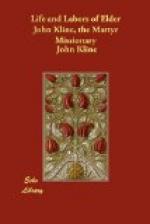One fact is true of all these births; no matter how black, or deformed, or blind, or deaf, all these were spiritually, they were all born just as they wished to be; and all chose, with comparatively few exceptions, to remain in the state in which they were born. On the day of the crucifixion spirits from all classes of births culminated in the cry: “His blood be on us and our children.”
I hope what I have said may awaken some thought in the mind of each hearer, as to the state of his own heart. Do I love the Lord my God with all my heart, and my brother as I love myself? Do I show this love in my dealings with him, and in my daily conduct towards him? Do I show my love to the Lord by walking continually in his ways? Enoch walked with him thus for three hundred years. Am I careful to follow his example during the few years allotted me here? If I do not love my brother and find delight in his company here, how can I be happy with him in heaven? If I do not love the Lord here, in whose love alone there is bliss, what will heaven be to me?
No wonder the doom of the hypocrite is so fearful! When his cloak is removed and the wolf appears in the presence of the angels, will they not shrink from him as one of us would shrink from a viper coiled about our feet?
Brethren, let us be steadfast, unmovable, always abounding in the work of the Lord; forasmuch as we know that our labor is not in vain in the Lord.
Brother Kline bore a hearty testimony to Brother Miller’s discourse throughout.
A Short Discourse by Elder Daniel Garber.
Sunday, August 7.
TEXT.—For the law
was given by Moses, but grace and truth came by
Jesus Christ.—John
1:17.
By the law spoken of in the text we are to understand the Decalogue, or Ten Commandments, as they are usually called. We are not to understand that this law is not truth. Far from it. It is truth so sacred and holy in God’s sight that he directed Moses to construct an ark or small chest out of pure gold and place therein the two stone tablets on which the law was engraved by the finger of God, and keep them there forever.
Jesus the Lord honored it. He fulfilled it, not only in the letter, but in the spirit. His outward life was so righteous that none could convict him of sin. “He was holy, harmless, undefiled, and separate from sinners:” not separate in the sense of not eating and drinking with them, of not associating and conversing with them; but separate in the sense that he was not, like them, a transgressor of the law of God.
The Lord’s heart and hand were together in all he did. His thoughts and his words were one. His looks, and all the expressions of his face, were but images of the love within. His denunciations against Pharisaical hypocrisy, cloaked under the guise of outward rectitude, were like an avalanche of snow and ice, unlocked by the rays of the Sun of Righteousness.




